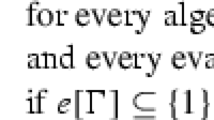Abstract
In this paper we consider the expansions of logics of a left-continuous t-norm with truth-constants from a subalgebra of the rational unit interval. From known results on standard semantics, we study completeness for these propositional logics with respect to chains defined over the rational unit interval with a special attention to the completeness with respect to the canonical chain, i.e. the algebra over \([0,1] \cap {{\mathbb{Q}}}\) where each truth-constant is interpreted in its corresponding rational truth-value. Finally, we study rational completeness results when we restrict ourselves to deductions between the so-called evaluated formulae.

Similar content being viewed by others
Notes
See Běhounek and Cintula (2006) for some rationale supporting the idea of fuzzy logics as the logics of chains.
Notice that we could consider parameterized isomorphic t-norms \(*^c_{n_1}\) or \(*^c_{n_2}\) : in the first the case by defining the negation using any \(c \in (0,1)\) instead of \({\frac{1}{2}},\) and in the second case by using any \(c \in ({\frac{1}{2}},1)\) instead of \({\frac{2}{3}}\) (and \(1-c\) instead of \({\frac{1}{3}}\)).
Looking at Table 2, this is the case of the S\({\fancyscript{R}}\)C and the Canonical completeness properties for some of the logics under our scope.
Notice that the particular choice of an element \(a \in (0,1)^{\mathbb{Q}}\) is not important, as all the resulting algebras are isomorphic and hence they yield the same logic.
References
Běhounek L, Cintula P (2006) Fuzzy logics as the logics of chains. Fuzzy Sets Syst 157:604–610
Blok WJ, Pigozzi D (1989) Algebraizable logics. Mem Am Math Soc 396, vol 77
Cignoli R (2000) Notas para el curso Álgebras de la lógica borrosa. Department of Mathematics, F.C.E. y N., University of Buenos Aires (in English)
Cignoli R, Esteva F, Godo L, Torrens A (2000) Basic fuzzy logic is the logic of continuous t-norms and their residua. Soft Comput 4:106–112
Cignoli R, Esteva F, Godo L (2007) On Lukasiewicz logic with truth constants. In: Castillo O et al (eds) Theoretical advances and applications of fuzzy logic and soft computing ASC 42. Springer, Heidelberg, pp 869–875
Cintula P, Esteva F, Gispert J, Godo L, Montagna F, Noguera C (2009) Distinguished algebraic semantics for t-norm based fuzzy logics: methods and algebraic equivalencies. Ann Pure Appl Logic (to appear)
Esteva F, Domingo X (1980) Sobre negaciones fuertes y débiles en [0,1]. Stochastica 4:141–166
Esteva F, Godo L (2001) Monoidal t-norm based logic: towards a logic for left-continuous t-norms. Fuzzy Sets Syst 124:271–288
Esteva F, Gispert J, Godo L, Montagna F (2002) On the standard and rational completeness of some axiomatic extensions of monoidal t-norm based logic. Stud Log 71:199–226
Esteva F, Godo L, Montagna F (2004) Equational characterization of the subvarieties of BL generated by t-norm algebras. Stud Log 76:161–200
Esteva F, Godo L, Noguera C (2006a) On rational weak nilpotent minimum logics. J Multiple Valued Log Soft Comput 12:9–32
Esteva F, Godo L, Noguera C (2006b) Real, rational and finite chain semantics for fuzzy logics, Actas del XIII congreso español sobre tecnologí as y lógica fuzzy ESTYLF 2006. Ciudad Real, pp 83–88
Esteva F, Gispert J, Godo L, Noguera C (2007a) Adding truth-constants to logics of a continuous t-norm: axiomatization and completeness results. Fuzzy Sets Syst 158:597–618
Esteva F, Godo L, Noguera C (2007b) On completeness results for predicate Łukasiewicz, Product, Gödel, and Nilpotent minimum logics expanded with truth-constants. Mathw Soft Comput 14:233–246
Esteva F, Godo L, Noguera C (2009) On expansions of t-norm based logics with truth-constants. In: Gottwald S, Hájek P, Höhle U, Klement EP (eds) Fuzzy logics and related structures (to appear)
Gurevich YS, Kokorin AI (1963) Universal equivalence of ordered abelian groups. Algebra Log 2:37–39 (in Russian)
Hájek P (1998) Metamathematics of fuzzy logic. Trends in logic-studia logica library, vol 4. Kluwer, Dordrecht
Hájek P (2006) Computational complexity of t-norm based propositional fuzzy logics with rational truth-constants. Fuzzy Sets Syst 157:677–682
Jenei S, Montagna F (2002) A proof of standard completeness for Esteva and Godo’s logic MTL. Stud Log 70:183–192
Ling CH (1965) Representation of associative functions. Publ Math Debrecen 12:189–212
Mostert PS, Shields AL (1957) On the structure of semigroups on a compact manifold with boundary. Ann Math 65:117–143
Novák V (1990a) On the syntactico-semantical completeness of first-order fuzzy logic. Part I. Syntax and semantics. Kybernetika 26:47–66
Novák V (1990b) On the syntactico-semantical completeness of first-order fuzzy logic. Part II. Main results. Kybernetika 26:134–154
Noguera C, Esteva F, Gispert J (2008) On triangular norm based axiomatic extensions of the weak Nilpotent minimum logic. Math Log Q 54:387–409
Pavelka J (1979) On fuzzy logic I, II, III. Zeitschrift für Mathematische Logik und Grundlagen der Mathematik 25:45–52, 119–134, 447–464
Savický P, Cignoli R, Esteva F, Godo L, Noguera C (2006) On product logic with truth-constants. J Log Comput 16:205–225
Turunen E (1999) Mathematics behind fuzzy logic. Springer, Heidelberg
Acknowledgments
The authors acknowledge partial support by the Spanish project MULOG2 (TIN2007-68005-C04), including feder funds of the European Union, and by the Generalitat de Catalunya grant 2005-SGR-00093. The third author also acknowledges partial support from the grant 2006-BP-A-10043 of the Departament d’Educació i Universitats of the Generalitat de Catalunya.
Author information
Authors and Affiliations
Corresponding author
Additional information
This is an extended and revised version of the paper Rational Completeness Results for Prominent Propositional Fuzzy Logics with Truth-Constants. Proc. of ESTYLF’08, Mieres, Spain, pp. 133–139.
Rights and permissions
About this article
Cite this article
Esteva, F., Godo, L. & Noguera, C. Expanding the propositional logic of a t-norm with truth-constants: completeness results for rational semantics. Soft Comput 14, 273–284 (2010). https://doi.org/10.1007/s00500-009-0402-8
Published:
Issue Date:
DOI: https://doi.org/10.1007/s00500-009-0402-8




